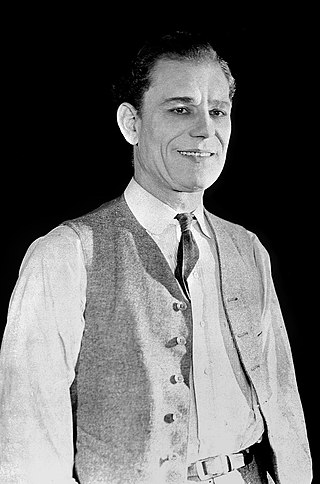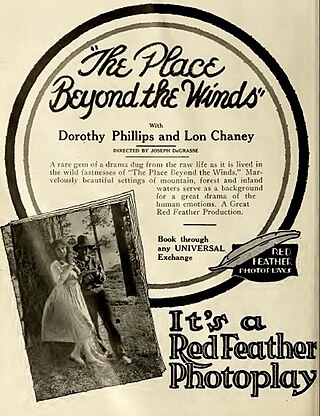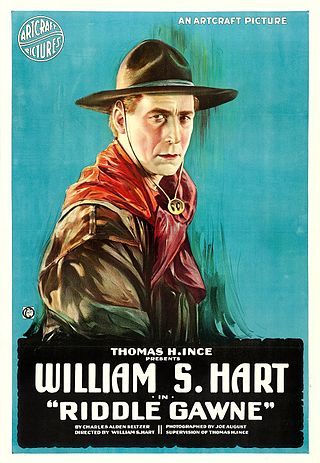
Leonidas Frank "Lon" Chaney was an American actor and makeup artist. He is regarded as one of the most versatile and powerful actors of cinema, renowned for his characterizations of tortured, often grotesque and afflicted, characters and for his groundbreaking artistry with makeup. Chaney was known for his starring roles in such silent horror films as The Hunchback of Notre Dame (1923) and The Phantom of the Opera (1925). His ability to transform himself using makeup techniques that he developed earned him the nickname "The Man of a Thousand Faces".

Victory is a psychological novel by Joseph Conrad first published in 1915, through which Conrad achieved "popular success."

Red Margaret, Moonshiner is a 1913 American silent short romance film directed by Allan Dwan, starring Pauline Bush, Murdock MacQuarrie and Lon Chaney. This film, now considered lost, is a good example of Chaney's early attempts at creating bizarre makeups to enhance his roles, wearing a long beard and wild hair here as "Lon", the old moonshiner. The film's original working title was Warrington's Honor. Some sources say the film was later edited down to one reel and re-released in theaters as Moonshine Blood in 1916.

The Tragedy of Whispering Creek is a 1914 American silent short Western film directed by Allan Dwan and featuring Murdock MacQuarrie, Pauline Bush, and Lon Chaney. Chaney expert Jon Mirsalis says Chaney also wrote the screenplay, based on a story by Elliott J. Clawson, but the Blake book says the film's director Allan Dwan wrote the screenplay himself. A print exists in the Deutsche Kinemathek film archive, making it Chaney's earliest surviving moving picture. A still exists which shows Chaney in his role as "The Greaser".
The Forbidden Room is a 1914 American silent drama film directed by Allan Dwan and featuring Murdock MacQuarrie, Pauline Bush and Lon Chaney. The film's working title was originally The Web of Circumstance. The film is now considered to be lost.

By the Sun's Rays is a 1914 American short silent Western film directed by Charles Giblyn and featuring Lon Chaney and Murdock MacQuarrie. It is one of the earliest surviving films of Lon Chaney, with several prints existing in private film collections and a video release in 1995. A still from the film exists showing Lon Chaney in the role of the villainous "Frank Lawlor".
Her Escape is a 1914 American silent drama film directed by Joe De Grasse and featuring Lon Chaney and Pauline Bush. Lon Chaney not only acted in this film, he also wrote the screenplay. The Blake book on Chaney states the film was actually released earlier on December 13, 1914, but all other sources say December 27. The film is now considered to be lost.
The Threads of Fate is a 1915 American silent drama film directed by Joe De Grasse, written by Tom Forman, and featuring Pauline Bush, William C. Dowlan and Lon Chaney. The film is now considered to be a lost film. A still exists showing Lon Chaney made up as "The Count" trying to persuade the heroine of the film to marry him.
When the Gods Played a Badger Game is a 1915 American silent drama film directed by Joe De Grasse and written by Ida May Park, and featuring Pauline Bush and Lon Chaney. The film's working title was The Girl Who Couldn't Go Wrong. The film is today considered lost.
Steady Company was a 1915 short silent drama film directed by Joe De Grasse and featuring Lon Chaney and Pauline Bush. It was written by Ida May Park, based on a story by Julius G. Furthman. The film is now considered to be lost.
The Grip of Jealousy is a 1916 American silent drama film directed by Joe De Grasse, written by Ida May Park and starring Lon Chaney and Louise Lovely. It was based upon Ida May Park's story "Love Thine Enemy". The film is today considered lost. Two still exist showing Lon Chaney in somewhat different make-ups, one as the character Silas Lacey, and the other as an older version of him

The Place Beyond the Winds is a 1916 American silent drama film directed by Joe De Grasse, and starring Lon Chaney, Gretchen Lederer and Dorothy Phillips. It was written by Ida May Park, based on the novel by Harriet T. Comstock. The director De Grasse also played a role in the film. The film's original working title was Mansion of Despair. A still exists showing Chaney in the role of Jerry Jo, the homeless man.
Accusing Evidence is a 1916 American silent Western film directed by Allan Dwan and starring Lon Chaney, Pauline Bush and Murdock MacQuarrie.

Riddle Gawne is a 1918 American silent Western film directed by William S. Hart and Lambert Hillyer, and featuring William S. Hart, Katherine MacDonald and Lon Chaney. The film was co-produced by William S. Hart and Thomas H. Ince. The screenplay was written by Charles Alden Seltzer from his earlier novel The Vengeance of Jefferson Gawne. Chaney historian Jon C. Mirsalis claims that William S. Hart contributed greatly to the screenplay but all other sources credit the writing of the screenplay solely to Charles Alden Seltzer.

Treasure Island is a 1920 silent film adaptation of the 1883 novel by Robert Louis Stevenson, directed by Maurice Tourneur, and released by Paramount Pictures. Lon Chaney played two different pirate roles in this production, "Blind Pew" and "Merry", and stills exist showing him in both makeups. Charles Ogle, who had played Frankenstein's Monster in the first filmed version of Frankenstein a decade earlier at Edison Studios, portrayed Long John Silver. Wallace Beery was supposed to play Israel Hands, but that role went to Joseph Singleton instead. The film was chosen as one of the Top Forty Pictures of the Year by the National Board of Review.

Victory is a 1996 French-German drama suspense film written and directed by Mark Peploe and starring Willem Dafoe, Irène Jacob, Sam Neill and Rufus Sewell. It is based on the 1915 novel of the same name by Joseph Conrad.

When Bearcat Went Dry is a 1919 American silent drama film directed by Oliver L. Sellers from the novel by Charles Neville Buck, and starring Lon Chaney as Kindard Powers. The title refers to a character nicknamed "Bearcat" who promises his girlfriend that he will quit drinking liquor. The plot involving a promise to give up drinking was timely given the passage of the Wartime Prohibition Act, which took effect on June 30, 1919, and banned the sale of alcoholic beverages, and ratification of the Eighteenth Amendment to the United States Constitution in January of the same year.

The Gift Supreme is a 1920 American silent drama film starring Bernard Durning, Seena Owen, Lon Chaney and Tully Marshall. The film was directed by Ollie Sellers and based on the 1916 novel of the same name by George Allan England. Most sources do not state who wrote the screenplay, although it was probably written by Ollie Sellers. The assistant director was Justin McKlosky. The supporting cast includes Melbourne MacDowell, Eugenie Besserer, Jack Curtis, Anna Dodge and Claire McDowell. Some sources state the film was released on April 12, 1920, but the majority say May 9.

A Man's Country is a 1919 silent Western drama film directed by Henry Kolker, and starring Alma Rubens, Alan Roscoe, and Lon Chaney. It was written by Richard Schayer based on a screen story by John Lynch. The poster's tagline was "A forceful and spectacular drama of the primitive West in the days of the Gold Rush, when men fought hard, women lived fast and human life was cheap."
Bondage is a 1917 American silent drama film written and directed by Ida May Park, and starring Dorothy Phillips, William Stowell, Gretchen Lederer and J.B. MacLaughlin.














